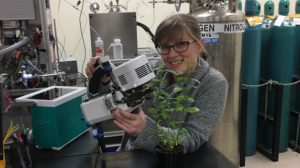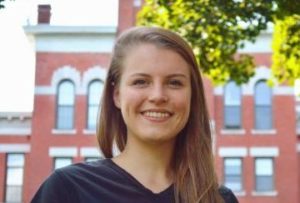Two students in the Department of Chemistry were among 15 Colorado State University graduate students selected in February to become the next VPR Graduate Student Fellows after participating in the “Three Minute Challenge Competition.”
Ph.D. students Blaine McCarthy and MJ Riches were chosen to continue research for the Department of Chemistry based on the challenge, which tasked them with summarizing their research for a general audience in three minutes.
The VPR Fellowship provides networking opportunities, travel funds for conferences and a stipend for research, totaling up to $4,000 in scholarship. For her travel funds, Riches plans to attend the American Geophysical Union Fall Meeting, where she hopes to do a verbal presentation. Also hoping to do a verbal presentation, McCarthy plans to use her travel funds to attend one of this year’s American Chemical Society (ACS) National Meeting & Expos.
As part of the fellowship, it offers professional development support with workshops on communicating about complex situations with non-science individuals.
“Communicating my research to loved ones who are not scientists is an important part of my life,”Riches said. “Through workshops the VPR Fellowship offers, I’m excited to grow and improve my ability to share science with the world, including improving the public’s understanding on how we can help the environment when it comes to voting. I also feel strongly about the universal availability of quality science education for children and teens.”
As a third-year Ph.D. student in chemistry, Riches’ research blends analytical chemistry, atmospheric chemistry and plant physiology to have a multidisciplinary approach on experiments regarding climate change.
In her three-minute presentation — “A Plant’s Role at the Crossroads of Climate Change” — Riches touched on the fact that current experiments are only focusing on one of the aspects of climate change regarding plants such as droughts. However, she said, there is much more to consider such as the heat that accompanies droughts and other environmental factors.
To properly study the plant’s role in climate change, Riches will expose plants to both single and combined stress utilizing a technique she optimized that simultaneously measures photosynthesis and volatile emissions. With an intensive variability study, she hopes to improve climate modeling by elucidating trends of specific emissions during different abiotic stresses.
McCarthy, a fourth-year Ph.D. student in chemistry, started her three-minute presentation — “Growing Green Plastics Using the Sun” — on the importance of plastic as it is used in almost everything from toothbrushes and shoes to biomedical devices and electronics. With more than 300 pounds of plastic per person being created each year, McCarthy is working toward finding a more economical and environmental way to create plastic.
“The aspect of chemistry that drew me to this scientific discipline over others was the ability to create,” said McCarthy, whose research focuses on polymer chemistry. “Learning chemistry and executing research provides me with a means to go beyond the study of existing systems to create new materials.”
For the past four years, McCarthy has been developing systems for organocatalyzed atom transfer radical polymerization (O-ATRP), a plastic making process that is driven by light and is metal-free. By utilizing sunlight as a renewable energy source instead of heat, she said there could be a decrease in the four percent of global energy currently used to make plastics.
McCarthy’s research will continue to study how to make the process of plastic creation more environmentally friendly by looking for new starting materials to use that come from materials derived from natural resources
“Interacting with graduate students from other disciplines is a unique opportunity provided by the VPR Fellowship,” McCarthy said. “I’m looking forward to learning about the other fellows’ research and growing within my own abilities to speak effectively to diverse audiences.”
The VPR Fellowship officially begins July 1 with monthly workshops starting in August. Workshop topics can include interacting with the media, grant writing, negotiation, individual development plans, entrepreneurship and more. All workshops are flexible and specified to the graduate students’ interests. For more information on the program, visit https://vpr.colostate.edu/vpr-fellows-program/.